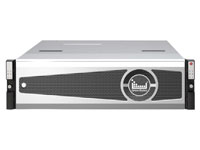Another SSD deal? You bet!
GreenBytes snagged $12 million in Series B funding from Al Gore’s venture capital fund, Generation Investment Management. Battery Ventures and GreenBytes’ management team chipped in as well. GreenBytes, a dedupe specialist and maker of SSD and hybrid disk arrays, plans to use the money to expand into the global marketplace and shore up its R&D.
Not too long ago, solid-state drives were a costly outlier technology that only the most moneyed businesses and individuals dared to implement. Though SSDs fetched files at blinding speed and helped tear through workloads like a bat out of hell — while barely consuming energy to boot — sky-high prices and dubious durability kept them from seriously challenging hard disk drives (HDDs).
Not anymore. These days, it’s tough to keep up with all the SSD related deals, product reveals and leaps forward in flash technology — I should know, it’s my job.
The Hard Drive’s Days Numbered?
One thing that struck me about the GreenBytes funding story is how storage execs are flat out coming out and saying that SSDs will kick HDDs to the curb, and sooner than you think.
Bob Petrocelli, CEO and CTO of GreenBytes, had this to say: “Primary storage optimization is accelerating the viability of flash storage in the enterprise, and we expect magnetic storage will be replaced with SSD technology faster than most analysts now predict.”
It’s a bold prediction. And one shared by Pure Storage, an all-SSD storage array maker that won’t touch an hard drive with a ten foot pole. CEO Scott Dietzen wrote in a blog post that Pure’s “all-flash storage that is 10X faster, more space and power efficient, and simpler than disk-centric arrays at a comparable price of $5-10 dollars per GB usable.”
Some big guns are aiming for HDD makers, too.
Last month during a press press event for Intel’s new flash PCIe server cards, Alan Frost, marketing programs manager, boldly proclaimed that his company wants nothing less than to see that “every hard drive in a data center environment is replaced by an SSD.”
Of course Intel does, now that it makes SSDs of its own. But a several factors like low-cost MLC chips that approach the hardiness of SLC chips, falling prices and increased awareness and adoption are steadily turning those hopes into reality.


Leave a Reply